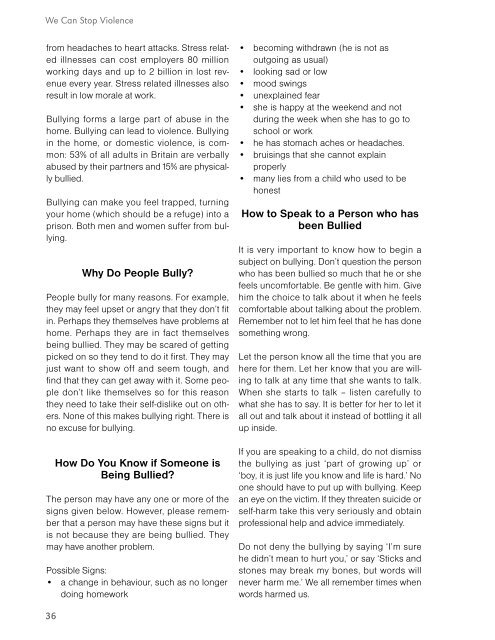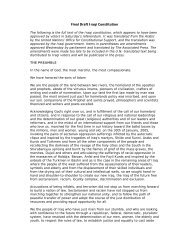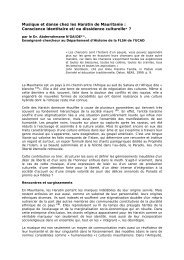Stop Violence workbook 1 - Unesco
Stop Violence workbook 1 - Unesco
Stop Violence workbook 1 - Unesco
You also want an ePaper? Increase the reach of your titles
YUMPU automatically turns print PDFs into web optimized ePapers that Google loves.
We Can <strong>Stop</strong> <strong>Violence</strong><br />
from headaches to heart attacks. Stress related<br />
illnesses can cost employers 80 million<br />
working days and up to 2 billion in lost revenue<br />
every year. Stress related illnesses also<br />
result in low morale at work.<br />
Bullying forms a large part of abuse in the<br />
home. Bullying can lead to violence. Bullying<br />
in the home, or domestic violence, is common:<br />
53% of all adults in Britain are verbally<br />
abused by their partners and 15% are physically<br />
bullied.<br />
Bullying can make you feel trapped, turning<br />
your home (which should be a refuge) into a<br />
prison. Both men and women suffer from bullying.<br />
Why Do People Bully?<br />
People bully for many reasons. For example,<br />
they may feel upset or angry that they don’t fit<br />
in. Perhaps they themselves have problems at<br />
home. Perhaps they are in fact themselves<br />
being bullied. They may be scared of getting<br />
picked on so they tend to do it first. They may<br />
just want to show off and seem tough, and<br />
find that they can get away with it. Some people<br />
don’t like themselves so for this reason<br />
they need to take their self-dislike out on others.<br />
None of this makes bullying right. There is<br />
no excuse for bullying.<br />
How Do You Know if Someone is<br />
Being Bullied?<br />
The person may have any one or more of the<br />
signs given below. However, please remember<br />
that a person may have these signs but it<br />
is not because they are being bullied. They<br />
may have another problem.<br />
Possible Signs:<br />
• a change in behaviour, such as no longer<br />
doing homework<br />
• becoming withdrawn (he is not as<br />
outgoing as usual)<br />
• looking sad or low<br />
• mood swings<br />
• unexplained fear<br />
• she is happy at the weekend and not<br />
during the week when she has to go to<br />
school or work<br />
• he has stomach aches or headaches.<br />
• bruisings that she cannot explain<br />
properly<br />
• many lies from a child who used to be<br />
honest<br />
How to Speak to a Person who has<br />
been Bullied<br />
It is very important to know how to begin a<br />
subject on bullying. Don’t question the person<br />
who has been bullied so much that he or she<br />
feels uncomfortable. Be gentle with him. Give<br />
him the choice to talk about it when he feels<br />
comfortable about talking about the problem.<br />
Remember not to let him feel that he has done<br />
something wrong.<br />
Let the person know all the time that you are<br />
here for them. Let her know that you are willing<br />
to talk at any time that she wants to talk.<br />
When she starts to talk – listen carefully to<br />
what she has to say. It is better for her to let it<br />
all out and talk about it instead of bottling it all<br />
up inside.<br />
If you are speaking to a child, do not dismiss<br />
the bullying as just ‘part of growing up’ or<br />
‘boy, it is just life you know and life is hard.’ No<br />
one should have to put up with bullying. Keep<br />
an eye on the victim. If they threaten suicide or<br />
self-harm take this very seriously and obtain<br />
professional help and advice immediately.<br />
Do not deny the bullying by saying ‘I’m sure<br />
he didn’t mean to hurt you,’ or say ‘Sticks and<br />
stones may break my bones, but words will<br />
never harm me.’ We all remember times when<br />
words harmed us.<br />
36
















